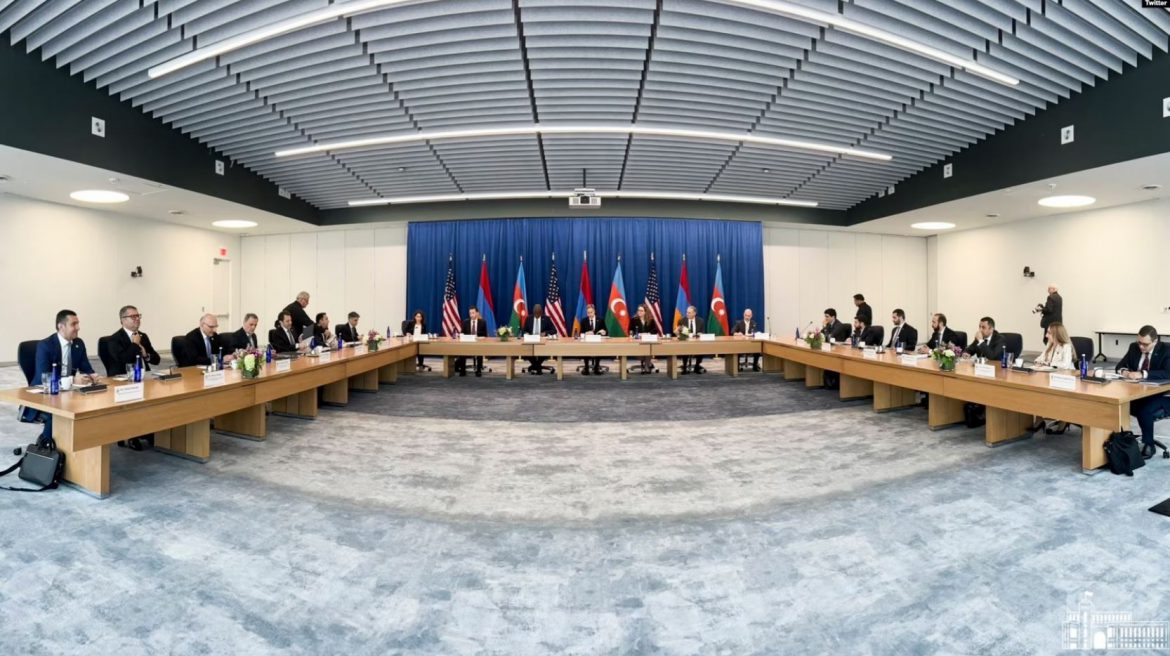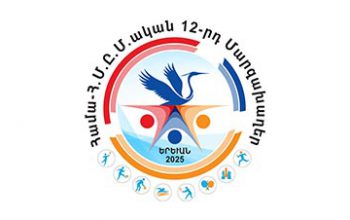The foreign ministers of Armenia and Azerbaijan met in Washington on Monday for another round of talks hosted by the United States that are aimed at hammering out a peace agreement between the two South Caucasus nations locked in a protracted conflict over Nagorno-Karabakh.
Before their meeting Armenia’s Ararat Mirzoyan and Azerbaijan’s Jeyhun Bayramov met separately with U.S. Secretary of State Antony Blinken, who had earlier expressed Washington’s continued support for the Armenia-Azerbaijan peace efforts.
Blinken then met the two visiting ministers together before what was expected to be their bilateral peace negotiations.
In a brief statement on the Blinken-Mirzoyan-Bayramov meeting Armenia’s Foreign Ministry said late on May 1 that “issues of the security situation in the region and the process of normalization of relations between Armenia and Azerbaijan were discussed.”
“The humanitarian situation resulting from the illegal blockade of the Lachin corridor by Azerbaijan was addressed,” the ministry added.
The readout on the meeting released by the Azerbaijani side did not have any mention of the Lachin corridor issue.
In weekend phone calls with the leaders of Armenia and Azerbaijan Blinken reportedly pledged Washington’s continued support for the two countries’ peace efforts.
In his phone call with Armenian Prime Minister Nikol Pashinyan he reiterated that “direct dialogue and diplomacy are the only path to a durable peace in the South Caucasus” and “expressed his appreciation for the Prime Minister’s continued commitment to the peace process.”
Talking to Azerbaijani President Ilham Aliyev, Blinken “shared his belief that peace was possible” and “expressed the United States’ deep concern that Azerbaijan’s establishment of a checkpoint on the Lachin corridor undermines efforts to establish confidence in the peace process, and emphasized the importance of reopening the Lachin corridor to commercial and private vehicles as soon as possible.”
Azerbaijan installed the checkpoint at the only road connecting Nagorno-Karabakh with Armenia on April 23. The move tightened the already existing blockade of the mostly ethnic Armenian-populated region that was effectively imposed by government-backed Azerbaijani protesters back in December.
Yerevan and Stepanakert view the roadblock as illegal and contradicting the Moscow-brokered ceasefire agreement that put an end to a six-week Armenian-Azerbaijani war over Nagorno-Karabakh and placed solely Russian peacekeepers in charge of providing security for Nagorno-Karabakh and ensuring free movement for its people along the five-kilometer-wide corridor.
Official Baku denies blockading Nagorno-Karabakh, pledging to ensure, “in cooperation with Russian peacekeepers” deployed in the region, all “necessary conditions” for “a transparent and orderly passage of Armenian residents living in the Karabakh region of Azerbaijan” in both directions. It stresses that the checkpoint was installed in Azerbaijan’s sovereign territory and calls Armenia’s interference with the affair “unacceptable.”
A senior U.S. Department of State official told RFE/RL’s Armenian Service on May 1 that Mirzoyan-Bayramov negotiations in Washington will last for “several days.”
Armenia and Azerbaijan have been locked in a conflict over Nagorno-Karabakh for decades. Some 30,000 people were killed in a war in the early 1990s that left ethnic Armenians in control of the predominantly Armenian-populated region and seven adjacent districts of Azerbaijan proper.
Decades of internationally mediated talks failed to result in a diplomatic solution and the simmering conflict led to another war in 2020 in which nearly 7,000 soldiers were killed on both sides.
The six-week war in which Azerbaijan regained all of the Armenian-controlled areas outside of Nagorno-Karabakh as well as chunks of territory inside the Soviet-era autonomous oblast proper ended with a Russia-brokered ceasefire under which Moscow deployed about 2,000 troops to the region to serve as peacekeepers.
Tensions along the restive Armenian-Azerbaijani border and around Nagorno-Karabakh leading to sporadic fighting and loss of life have persisted despite the ceasefire. At least three Azerbaijani and four Armenian soldiers were killed in the most recent border skirmish on April 11.
Source: Azatutyun.am




